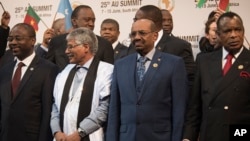A prominent member of South Africa’s opposition Democratic Alliance (DA) says the country faces a constitutional crisis if President Jacob Zuma invites Sudan’s president to visit the country in December.
James Selfe, DA federal executive chairman, said Wednesday that it appeared the president and his administration were on a collision course with the country’s courts.
His comments came after a court rejected a government appeal of a ruling that said the administration was wrong in allowing Sudan's Omar Hassan al-Bashir to leave the country following an African Union Summit in June.
Selfe said the opposition party welcomed the court’s ruling.
“We think that is a triumph of rule of law, and we are very pleased that the courts have taken a principled position on this matter, because at the time we were outraged by the fact President al-Bashir was invited to South Africa," he said. "He arrived here in clear contravention to our obligations under the Rome Statute, and in clear breach of an act of parliament, which internalized the obligations of the Rome Statute.”
He said the government acted in bad faith after a court in Pretoria ruled that Bashir should be prevented from leaving the country when he attended the African Union summit.
Selfe said the administration deliberately ignored the court’s ruling by helping the Sudanese leader to leave.
'Wrong message'
Last month, Zuma defended his government’s action, saying that Bashir had immunity as a guest of the African Union.
The African Union has often accused the Hague-based International Criminal Court of targeting African leaders. The ICC has indicted Bashir on war crimes and crimes against humanity charges in Darfur. South Africa is a signatory to the Rome Statute that established the ICC.
Local media quoted Zuma as saying he would travel to Sudan and would invite Bashir to visit South Africa before the end of the year.
Selfe said Zuma would yet again be violating the country’s obligation to the Rome Statute if he invited the Sudanese leader to the country.
He said Zuma’s action was provocative and sent the wrong signals both to South Africans and the international community.
“It sends out entirely the wrong message to the international community," Selfe said. "The other message that is being sent out is that we have courts in South Africa, that the courts are independent, that they are prepared to take on the executive, and that bodes well of our constitutional democracy.
“If the invitation goes ahead to President Bashir to visit South Africa in December, it is going to put the court against the executive, and I think that’s going to constitute a constitutional crisis in South Africa,” he said.




